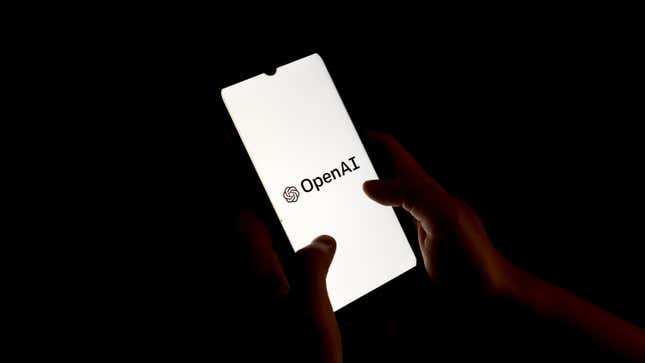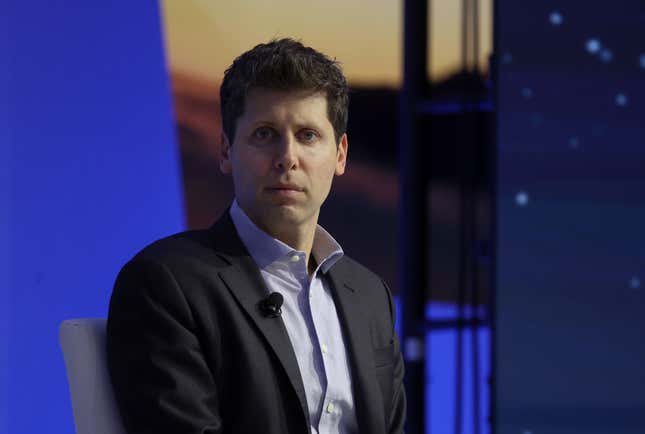Lucas Ropek
Source Link

Welcome to AI This Week, Gizmodo’s weekly roundup where we do a deep dive on what’s been happening in artificial intelligence.
This week, Forbes reported that a surveillance company called Social Links had begun using ChatGPT to conduct sentiment analysis. The creepy field by which cops and spies collect and analyze social media data to understand how web users feel about stuff, sentiment analysis is one of the sketchier use-cases for the little chatbot to yet emerge.
Social Links isn’t exactly a stranger to controversy. The company, which characterizes itself as an open source intelligence (or, OSINT) business, was previously kicked off Facebook and Instagram after Meta accused it of surveilling users. Social Links has since denied the accusations. This week, the firm showed off its unconventional use of ChatGPT at a security conference in Paris, weaponizing the chatbot’s ability for text summarization and analysis to troll through large chunks of data, digesting it quickly. In a demonstration, the company fed data collected by its own proprietary tool into ChatGPT; the data, which related to online posts about a recent controversy in Spain, was then analyzed by the chatbot, which rated them “as positive, negative or neutral, displaying the results in an interactive graph,” Forbes writes.
Obviously, privacy advocates have found this more than a little disturbing—not merely because of this specific case, but for what it says about how AI could escalate the powers of the surveillance industry in general.
Rory Mir, associate director of community organizing with the Electronic Frontier Foundation, said that AI could help law enforcement broaden their surveillance efforts, allowing smaller teams of cops to surveil larger groups with ease. Already, police agencies frequently use fake profiles to embed themselves in online communities; this kind of surveillance has a chilling effect on online speech, Mir said. They added: “The scary thing about stuff like ChatGPT is that they can scale up that kind of operation.” AI can make it “easier for cops to run analysis quicker” on the data they collect during these undercover operations, meaning that “AI tools are [effectively] enabling” online surveillance, they added.
Mir also noted a glaring problem with this kind of use of AI: chatbots have a pretty bad track record of messing up and delivering bad results. “AI is really concerning in high-stakes scenarios like this,” Mir said. “It’s one thing to have ChatGPT read a draft of your article so that you can ask it ‘How acceptable is this?’ But when it moves into the territory of, say, determining if somebody gets a job, or gets housing, or, in this case, determines whether someone gets undue attention from police or not, that is when those biases become, not just a thing to account for, but a reason not to use it in that way [at all].”
Mir added that the “black box” of AI training data means that it’s hard to be sure whether the algorithm’s response will be trustworthy or not. “I mean, this stuff is trained on Reddit and 4chan data,” Mir chuckles. “So the biases that come from that underlying data are going to reappear in the mosaic of its outputs.”
Question of the day: WTF did Sam Altman do?

Photo: Justin Sullivan.
In what has to be one of the most shocking upsets in recent tech history, Sam Altman has been ousted from his position as CEO of OpenAI. On Friday, a statement was released by the company announcing an abrupt leadership transition. “Mr. Altman’s departure follows a deliberative review process by the board, which concluded that he was not consistently candid in his communications with the board, hindering its ability to exercise its responsibilities. The board no longer has confidence in his ability to continue leading OpenAl.” In the immediate power vacuum opened up by this shocking turn of events, the board has apparently selected Mira Murati, the company’s chief technology officer, to serve as interim CEO, the press release states. So far, it’s entirely unclear what Sam might have done to allow such a catastrophic career nose-dive to take place. You have to seriously screw up to go from being Silicon Valley’s prince of the city to pariah in the course of the day. I am waiting on pins and needles to hear what exactly happened here.
No comments:
Post a Comment